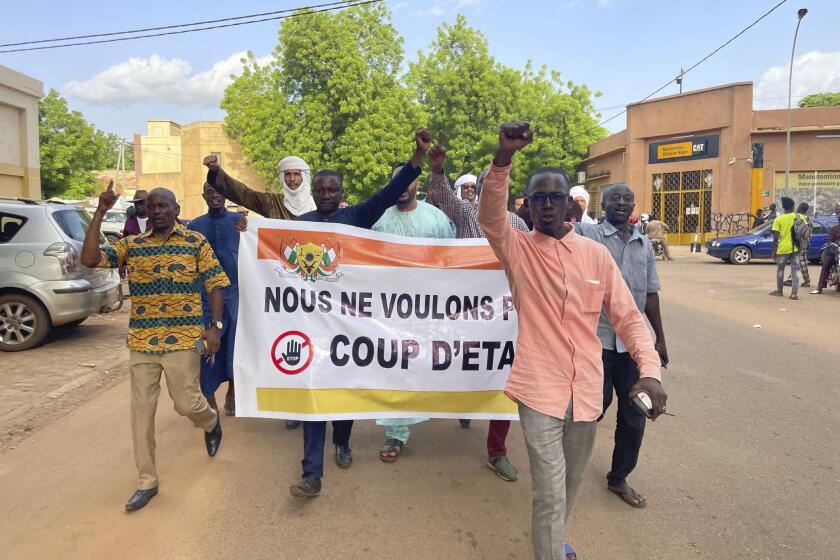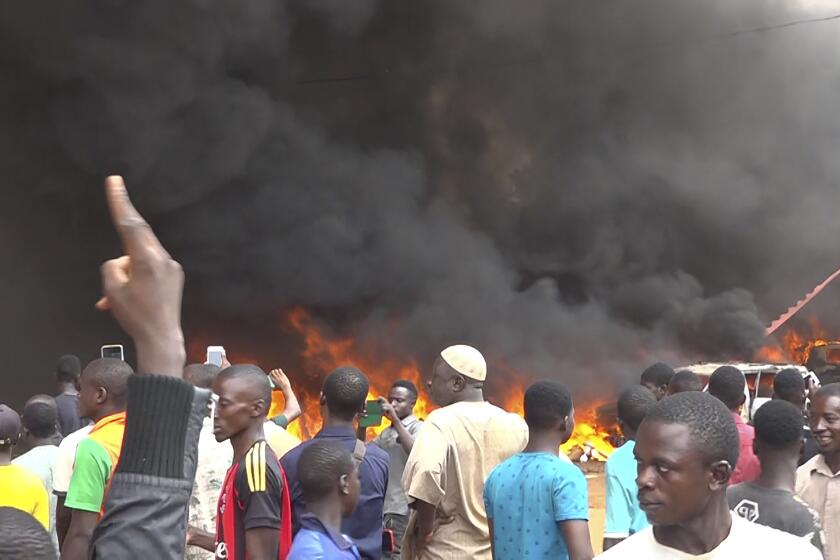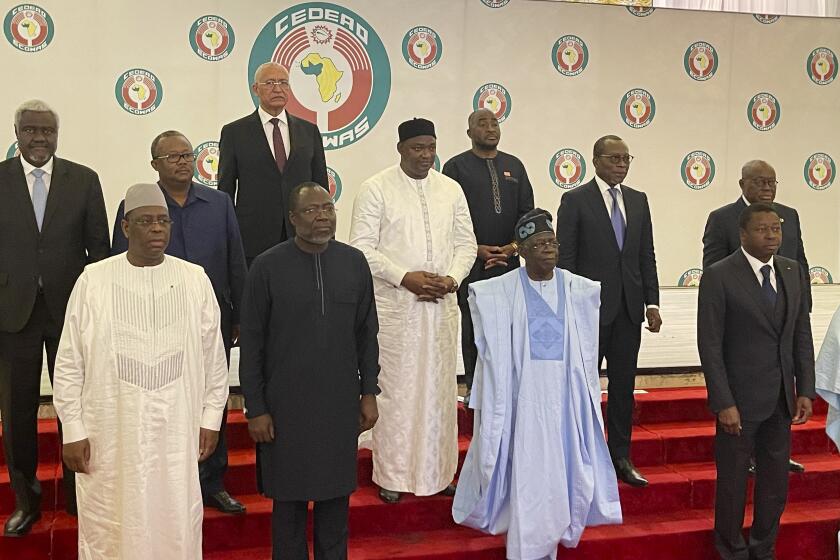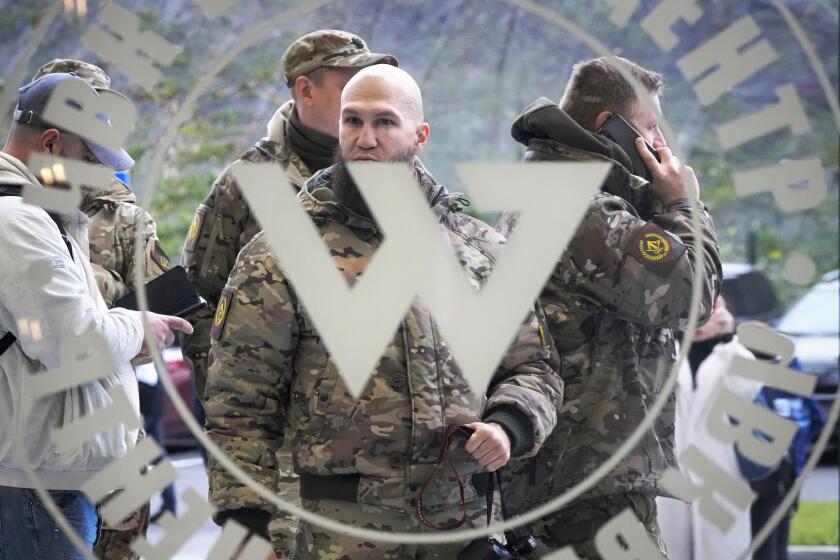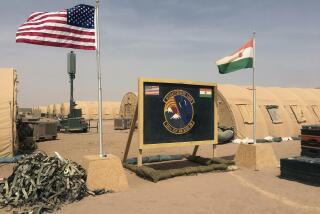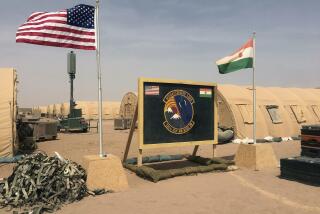Niger crisis deepens as France plans evacuation and coup leaders get support from neighboring juntas
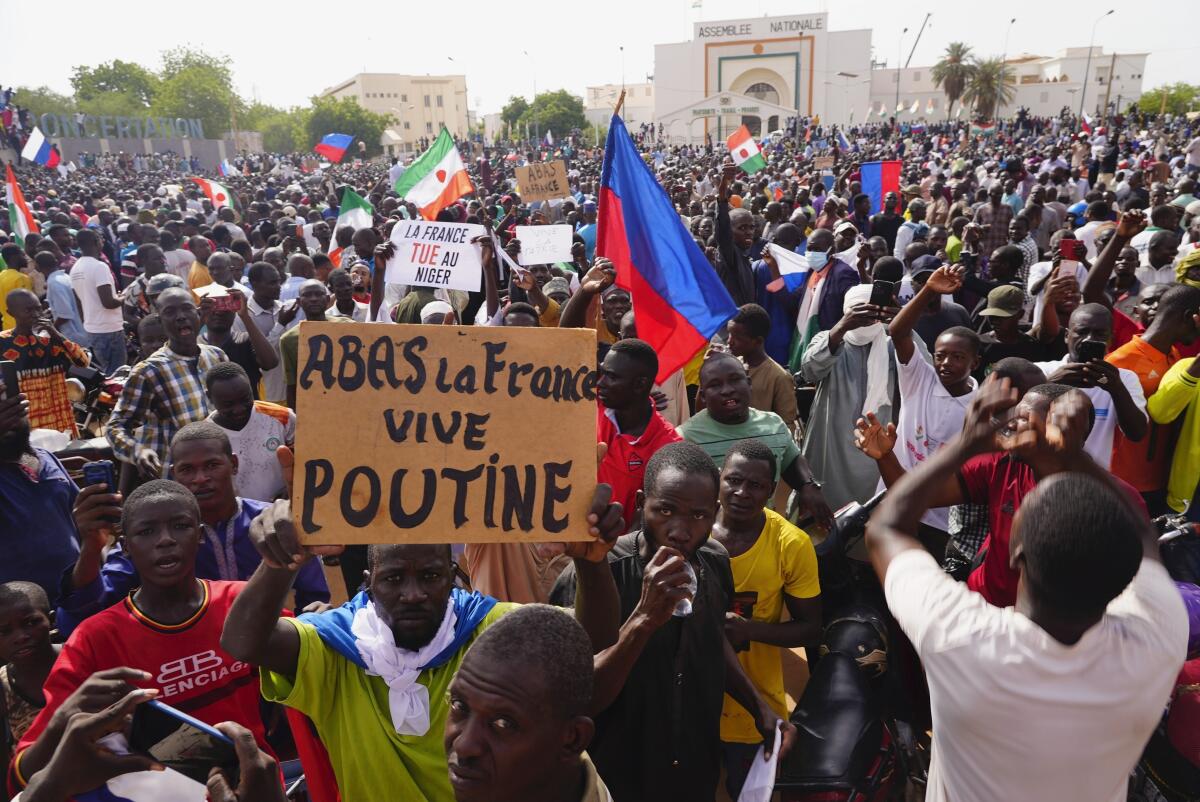
NIAMEY, Niger — A French military transport plane carrying Europeans departed Niger on Tuesday in the first such evacuation flight since mutinous soldiers ousted the country’s democratically elected president nearly a week ago and shut its borders.
France, Italy and Spain all announced evacuations from Niger for their citizens and other European nationals, concerned that they risked becoming trapped by the coup that won backing Tuesday from three other West African nations also ruled by mutinous soldiers.
About 600 French nationals want to leave, along with 400 people of other nationalities from Belgians to Danish, French officials said. The first flight carried mostly French nationals, and officials hope to finish the evacuation flights by Wednesday.
With Niger’s air space closed, France coordinated the evacuations with the regime that ousted the nation’s leader, but without withdrawing its support for democratically elected President Mohamed Bazoum, diplomatic officials said.
The ministry cited recent violence that targeted its embassy in Niamey, the capital, as one of the reasons for its decision to offer evacuation flights to its citizens and other Europeans. Spain’s Defense Ministry announced preparations to evacuate more than 70 nationals, and Italy also said it was arranging a flight.
The evacuations come during a deepening crisis sparked by the coup last week against Bazoum. His apparent overthrow is a blow for Western nations that were working with Niger against West African extremists.
Members of Niger’s presidential guard surrounded the presidential palace in what African organizations called an attempted coup.
In Niamey hotels, Europeans and other nationalities, including some Americans, packed bags. At the airport, hundreds of people lined up for hours waiting to leave on French evacuation flights.
A former French military official who had been training the Nigerien army as a civilian told the Associated Press that he was departing even though his “job is not finished.” Speaking on condition of anonymity for security reasons, he said the military takeover took many people by surprise.
The West African regional body known as ECOWAS announced travel and economic sanctions against Niger on Sunday and said it could use force if the coup leaders don’t reinstate Bazoum within one week.
Niger is seen as the last reliable partner for the West to battle jihadists linked to Al Qaeda and Islamic State in Africa’s Sahel region. A coup endangers that.
The United Nations special envoy for West Africa and the Sahel, Leonardo Santos Simão, held out hope that bloodshed could be avoided.
He said during a virtual news conference Tuesday he expects ECOWAS to go ahead with the deployment of troops to Niger if Bazoum isn’t restored to power. But “I believe that other efforts are under way, so I hope the use of force will not be necessary,” if “everybody talks in good faith, [and] wants to avoid bloodshed.”
The new junta got backing from the military governments of Mali, Burkina Faso and Guinea.
The military governments of Mali and Burkina Faso said in a joint statement that “any military intervention against Niger will be considered as a declaration of war against Burkina Faso and Mali.” The two countries also denounced ECOWAS’ economic sanctions as “illegal, illegitimate and inhumane” and refused to apply them.
Economic sanctions could hurt one of the world’s poorest nations and West’s last democratic partners against Islamic extremists in West Africa.
ECOWAS suspended all commercial and financial transactions between its member states and Niger, as well as freezing Nigerien assets held in regional central banks. Niger relies heavily on foreign aid, and sanctions could further impoverish its more than 25 million people.
Mali and Burkina Faso have each undergone two coups since 2020, as soldiers overthrew governments claiming they could do a better job fighting increasing jihadi violence linked to Al Qaeda and the Islamic State group. ECOWAS has sanctioned both countries and suspended them from the bloc but never threatened to use force.
Guinea, another country under military rule since 2021, also issued a statement in support of Niger’s junta and urged ECOWAS to “come to its senses.”
The evacuations followed violence Sunday that targeted the French Embassy, with protesters burning down a door and smashing windows before the Nigerien army dispersed them. Thousands of pro-junta supporters took to the streets in Niamey, denouncing France, waving Russian flags along with signs reading “Down with France” and supporting Russian President Vladimir Putin and telling the international community to stay away.
Russian President Vladimir Putin’s KGB years in East Germany offer a window into his crackdown on protests, war on Ukraine and yearning for empire.
There has been no clear explanation of the references to Russia, but some demonstrators regard the country as symbolizing their anti-Western feelings. Some may also reflect support for the Russian mercenary group Wagner‘s reputation for ruthlessly suppressing militants.
Russian private military contractor Wagner is busy boosting its brand as its fighters try to subdue Ukraine, trading secrecy for war propaganda movies.
Niger could be following in the same footsteps as Mali and Burkina Faso, both of which saw protesters waving Russian flags after their coups, analysts say.
Niger’s coup could also embolden jihadi violence, some say.
Boubacar Moussa, a former member of an Al Qaeda-linked group known as JNIM, said the military overthrow is exactly what the jihadis want because it will distract and weaken the army. “Jihadis are very supportive of this coup that happened in Niger, because it will allow them to become very strong,” he said.
Moussa, who spoke to the AP in Niamey, is part of a nationwide program to bring back jihadis, reintegrate them into society and use their help in counterterrorism efforts. It was spearheaded by Bazoum when he was minister of interior and is intended as an alternative to a military solution to stem violence across the country. The AP cannot verify that Moussa actively fought for JNIM.
If ECOWAS uses force, it could also trigger violence between civilians supporting the coup and those against it, Niger analysts say.
Niger’s prime minister, who was appointed by Bazoum and was out of the country when the coup took place, urged the international community to help roll back the coup in order to defend democracy in West Africa.
“For the ECOWAS countries, it’s a question of survival. For the international community too, it’s a question of credibility. Niger must remain a democratic state,” Prime Minister Ouhoumoudou Mahamadou said in an interview with the Associated Press in France.
“Niger is a key country in terms of security for the rest of Africa, but also for the rest of the world,” he said.
Observers believe Bazoum is being held at his house in Niamey. The first photos of him since the coup appeared Sunday evening, sitting on a couch smiling beside Chad President Mahamat Deby, who had flown in to mediate between the government and the junta.
Both the United States and France have sent troops and hundreds of millions of dollars of military and humanitarian aid in recent years to Niger, which was a French colony until 1960. In the capital, many people live in makeshift shelters and scramble daily to make enough money to feed their children. Niger was seen as the last administration working with the West against extremism in a Francophone region where anti-French sentiment opened the way for the Russian private military group Wagner.
The U.S. will consider cutting aid if the coup is successful, the State Department said Monday. Aid is “very much in the balance depending on the outcome of the actions in the country,” said department spokesman Matt Miller. “U.S. assistance hinges on continued democratic governance in Niger.”
More to Read
Sign up for Essential California
The most important California stories and recommendations in your inbox every morning.
You may occasionally receive promotional content from the Los Angeles Times.
